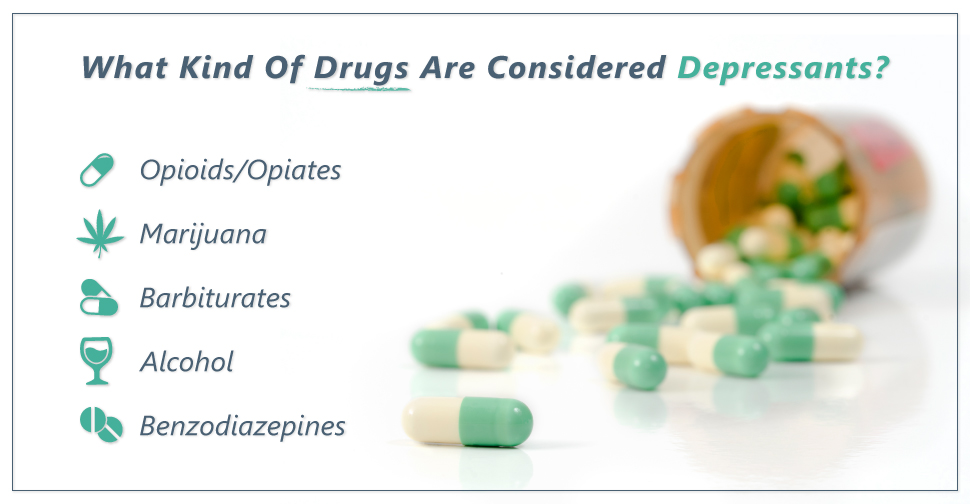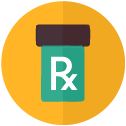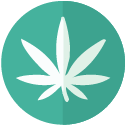
A depressant is a drug that lessens arousal or stimulation by slowing neurotransmission levels in the brain. Depressants are used and prescribed for a variety of reasons, including sedation, anti-seizure treatment, and pain relief. When abused, these drugs can have severely adverse effects on the body. Also referred to as “downers,” the most common depressants include alcohol, barbiturates, benzodiazepines, marijuana, and opioids.
Alcohol
 Alcohol is a common depressant, as it is legal to purchase and consume for people of age. Most commonly used as a recreational enhancement, alcohol contains ethanol, an anesthetic that causes intoxication. While it is legal, many cases of alcohol abuse and alcoholism are reported. According to the National Institute on Alcohol Abuse and Alcoholism (NIH), the adverse effects of alcohol abuse include:
Alcohol is a common depressant, as it is legal to purchase and consume for people of age. Most commonly used as a recreational enhancement, alcohol contains ethanol, an anesthetic that causes intoxication. While it is legal, many cases of alcohol abuse and alcoholism are reported. According to the National Institute on Alcohol Abuse and Alcoholism (NIH), the adverse effects of alcohol abuse include:
- Stretching and drooping of the heart muscle over time
- Irregular heartbeat, stroke, and high blood pressure
- Alcoholic hepatitis, fibrosis, and cirrhosis of the liver
- Increased risk of cancer in the mouth, esophagus, throat, liver, and breast
- Weakened immune system
- Disorientation
- Vision difficulty
- Injury from intoxication
- Agitation and depression
Nearly ninety percent of people ages 18 or older reported drinking alcohol at some point in their lives, while 24.7 percent reported that they have engaged in binge drinking, which increases the chances that negative effects and alcoholism can surface. Alcohol is among the most commonly accompanied substances in drug-related ER visits, as well.
Opioids/Opiates
 Opioids or opiates have become increasingly popular in the US, due in part to the increase in prescriptions for pain relief. This highly addictive substance is categorized as a depressant, although certain areas of the brain are stimulated when it is used. The analgesic and narcotic qualities do offer depressant factors, particularly when used in higher doses. Some health complications from opioid use include:
Opioids or opiates have become increasingly popular in the US, due in part to the increase in prescriptions for pain relief. This highly addictive substance is categorized as a depressant, although certain areas of the brain are stimulated when it is used. The analgesic and narcotic qualities do offer depressant factors, particularly when used in higher doses. Some health complications from opioid use include:
- Shallow breathing and heart palpitations
- Sweating, chills, and nausea
- Hypersensitivity to stimuli from increased dosage
- Confusion
Withdrawal from opioid addiction can be very dangerous without medical assistance. Certain opioid medications, such as Suboxone and Methadone, offer relief from some withdrawal symptoms in early recovery.
Barbiturates
When used as directed, barbiturates are effective in treating a variety of ailments. The anesthetic/depressant qualities offer aid with full sedation for anesthesia, seizure control, and pain relief. Barbiturates can cause many adverse effects in the body when misused, including:
- Risks to pregnancy
- Psychological and physical addiction
- Accidental overdose, sedation, and death
- Heart palpitations
Barbiturates can become addictive in a short amount of time and are responsible for 1,493 ER visits last year. Nine percent of surveyed high school students reported using barbiturates recreationally, and may be a factor in up to 33 percent of drug deaths last year.
Benzodiazepines
Benzodiazepines are thought to be less toxic than barbiturates and are categorized by short-, intermediate-, or long-acting doses. Most commonly used for psychological and sleep regulation, benzodiazepines can become addictive when misused. Depressant qualities create significant health concerns, similar to that of barbiturates.
Marijuana
 The presence of cannabidiol places marijuana in the depressant category. Marijuana causes muscle relaxation, sedation, and decreased alertness when used. Widely used for recreational purposes, marijuana can inhibit cognitive receptors and is thought to create a psychological dependence over time.
The presence of cannabidiol places marijuana in the depressant category. Marijuana causes muscle relaxation, sedation, and decreased alertness when used. Widely used for recreational purposes, marijuana can inhibit cognitive receptors and is thought to create a psychological dependence over time.
Additional Depressants
Additional drugs categorized as “depressants” are more commonly used for daily ailments. The effects may be less toxic on their own or are considered to be less likely to become misused. Some additional depressant drugs include:
- Antihistamines, typically used to resist histamines that are responsible for inflammation
- Muscle Relaxers, used to ease strain on the muscles due to injury, surgery, or debilitating conditions
- Anti-Psychotics, such as those used to treat bipolar mania, intended to stabilize a heightened mood during a manic episode
- Alpha and beta blockers, commonly used for Raynaud’s disease, hypertension, and anxiety disorders
Many medications offer depressant qualities. If you’ve ever taken an over-the-counter medication and experienced sleepiness, your body is reacting to the depressant effects of the drug. While these medications can be beneficial, following the directions is important to avoid adverse effects.
Understanding Depressants
Depressants offer many benefits for common ailments when used as directed. When these drugs are abused, the effects could lead to many complications. Understanding the risks and benefits of depressants and taking prescribed/OTC medications as intended is imperative to preventing significant problems. If you’ve become dependent on depressants, medically monitored treatment may be necessary for guided withdrawal and full recovery.
We Can Help
 The effects of depressants can cause many adverse reactions in your body and in your life. If you or a loved one is struggling with addiction, the caring staff at DrugRehab.org is here to help. We can answer your questions and offer resources to help you find relief. Contact us today.
The effects of depressants can cause many adverse reactions in your body and in your life. If you or a loved one is struggling with addiction, the caring staff at DrugRehab.org is here to help. We can answer your questions and offer resources to help you find relief. Contact us today.

